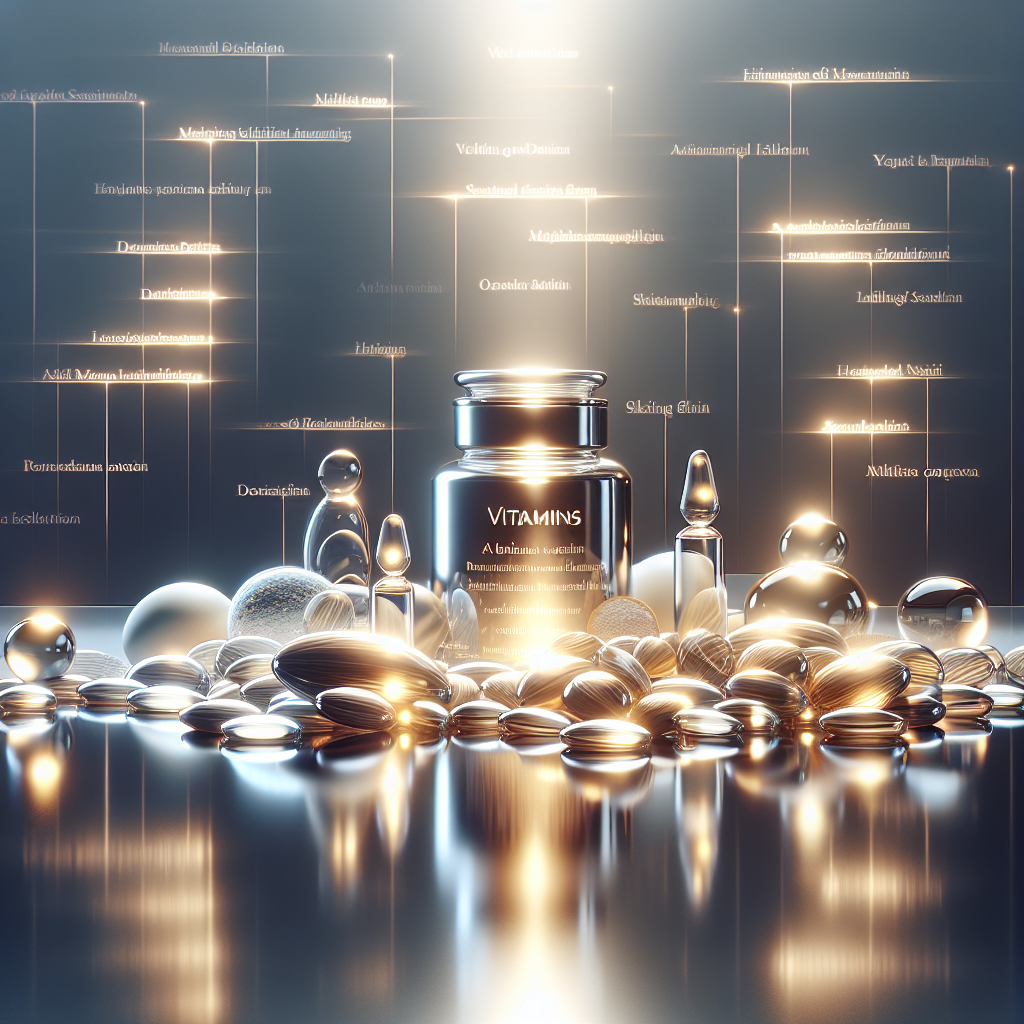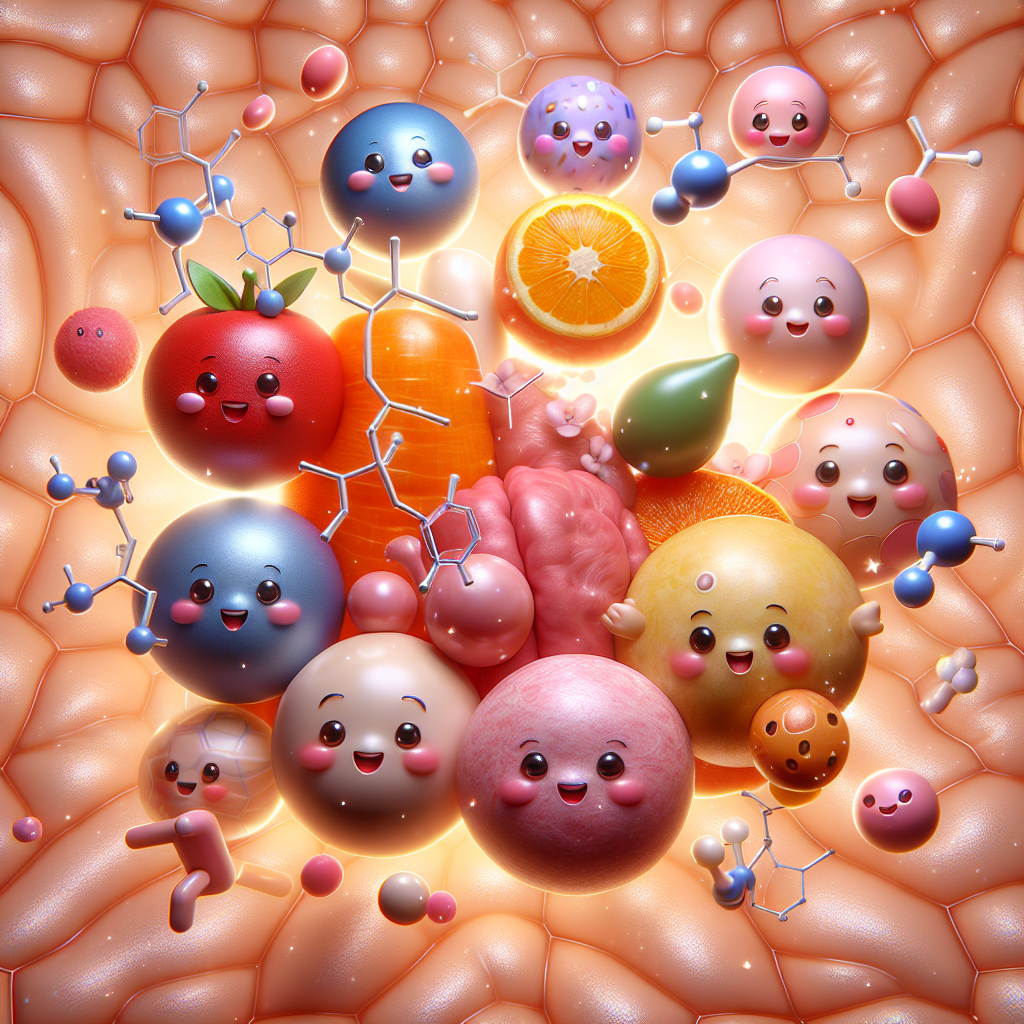Vitamins That Keep Skin Looking Youthful

Discover the secret to youthful-looking skin with our range of vitamins. Don’t wait, rejuvenate your skin today! Click here to explore our products.
Essential Vitamins for Maintaining Youthful Skin
The quest for youthful, radiant skin is a universal pursuit that transcends age, gender, and culture. While many turn to expensive creams, serums, and other topical treatments, the secret to maintaining youthful skin may lie in something far simpler and more accessible: vitamins. Indeed, certain vitamins play a crucial role in skin health, helping to combat the signs of aging and keep skin looking fresh and vibrant.
Firstly, let’s consider Vitamin A, often hailed as the ‘anti-aging’ vitamin. This powerful antioxidant is essential for cell growth and differentiation, which are vital processes for maintaining skin’s youthful appearance. Vitamin A helps to speed up the turnover of skin cells, promoting the replacement of old, damaged cells with new, healthy ones. This process helps to reduce the appearance of fine lines and wrinkles, and can also improve skin tone and texture. Foods rich in Vitamin A include sweet potatoes, carrots, and spinach.
Next on our list is Vitamin C, a potent antioxidant that plays a critical role in collagen synthesis. Collagen is a protein that provides structure and elasticity to the skin. As we age, our bodies produce less collagen, leading to sagging skin and the formation of wrinkles. By boosting collagen production, Vitamin C helps to maintain skin’s firmness and elasticity, keeping it looking youthful and vibrant. Citrus fruits, strawberries, and bell peppers are excellent sources of Vitamin C.
Vitamin E is another essential nutrient for skin health. Like Vitamins A and C, Vitamin E is a powerful antioxidant that helps to protect the skin from damage caused by free radicals. Free radicals are unstable molecules that can damage cells and contribute to aging and diseases. By neutralizing these harmful molecules, Vitamin E helps to prevent skin damage and slow down the aging process. Foods high in Vitamin E include nuts, seeds, and spinach.
Vitamin K is often overlooked in discussions about skin health, but it plays a crucial role in the body’s healing process. This vitamin helps with blood clotting, which is essential for the repair of skin damage. By aiding in the healing of wounds and bruises, Vitamin K can help to maintain the skin’s youthful appearance. Green leafy vegetables, such as kale and spinach, are rich in Vitamin K.
Lastly, let’s not forget about Vitamin D, often referred to as the ‘sunshine vitamin’. Our bodies produce Vitamin D when our skin is exposed to sunlight. This vitamin plays a crucial role in skin cell growth and repair, and can also help to fight off free radicals that can cause premature aging. Foods high in Vitamin D include fatty fish, cheese, and egg yolks.
In conclusion, maintaining youthful skin is not just about what you put on your skin, but also about what you put in your body. A diet rich in vitamins A, C, E, K, and D can help to keep your skin looking fresh, vibrant, and youthful. However, it’s important to remember that while vitamins can help to support skin health, they are not a substitute for a healthy lifestyle and good skincare routine. Always protect your skin from the sun, stay hydrated, and get plenty of sleep to keep your skin at its best.
The Role of Vitamins in Skin Anti-Aging

The quest for youthful, radiant skin is a universal pursuit that transcends age, gender, and culture. While many turn to expensive creams, serums, and even surgical procedures to maintain a youthful appearance, the role of vitamins in skin anti-aging is often overlooked. Vitamins, both consumed through diet and applied topically, play a crucial role in maintaining skin health and slowing the aging process.
Vitamin A, also known as retinol, is one of the most potent anti-aging vitamins. It stimulates the production of new skin cells and encourages the growth of collagen, a protein that gives skin its elasticity and firmness. By promoting cell turnover and collagen production, vitamin A helps to reduce the appearance of fine lines and wrinkles, giving the skin a more youthful appearance. It can be found in foods like sweet potatoes, carrots, and spinach, and is also a common ingredient in many anti-aging skincare products.
Vitamin C is another essential vitamin for skin health. It is a powerful antioxidant that protects the skin from damage caused by free radicals, unstable molecules that can cause premature aging. Vitamin C also plays a crucial role in collagen synthesis, helping to maintain skin firmness and elasticity. It can be found in a variety of fruits and vegetables, including oranges, strawberries, and bell peppers, and is also available in topical form.
Vitamin E, like vitamin C, is a potent antioxidant that protects the skin from oxidative stress caused by free radicals. It also has anti-inflammatory properties that can help to soothe and calm irritated skin. Vitamin E can be found in foods like nuts, seeds, and leafy green vegetables, and is also commonly used in skincare products for its moisturizing and healing properties.
Vitamin B3, also known as niacinamide, is another key player in skin anti-aging. It helps to improve the skin’s barrier function, keeping it hydrated and protecting it from environmental damage. Niacinamide also has anti-inflammatory properties and can help to reduce redness and irritation. It can be found in foods like chicken, tuna, and mushrooms, and is also available in topical form.
Vitamin K is often overlooked in discussions of skin health, but it plays a crucial role in the healing process and can help to reduce the appearance of dark circles and bruises. It can be found in foods like kale, spinach, and broccoli, and is also available in topical form.
In conclusion, vitamins play a crucial role in skin anti-aging. They help to stimulate cell turnover, promote collagen production, protect the skin from damage, and improve its barrier function. By incorporating a variety of vitamins into your diet and skincare routine, you can help to maintain your skin’s youthful appearance and slow the aging process. However, it’s important to remember that while vitamins can help to improve skin health, they are not a substitute for a healthy lifestyle. Regular exercise, a balanced diet, adequate sleep, and sun protection are all essential for maintaining youthful, healthy skin.
Top Vitamins to Incorporate for a Youthful Skin Glow
The quest for youthful, glowing skin is a universal pursuit that transcends age, gender, and culture. While topical skincare products and treatments play a significant role in maintaining skin health, the importance of nourishing the skin from within cannot be overstated. One of the most effective ways to achieve this is by incorporating certain vitamins into your diet. These vitamins not only promote overall health but also play a crucial role in maintaining the skin’s youthful glow.
Firstly, Vitamin A, also known as retinol, is a powerhouse when it comes to skin health. It aids in the repair and maintenance of the skin, promoting cell growth and differentiation. This vitamin is essential for the production of collagen, a protein that gives the skin its elasticity and firmness. By boosting collagen production, Vitamin A helps to reduce the appearance of fine lines and wrinkles, giving the skin a more youthful appearance. Foods rich in Vitamin A include sweet potatoes, carrots, and dark leafy greens.
Next on the list is Vitamin C, a potent antioxidant that protects the skin from damage caused by free radicals. Free radicals are unstable molecules that can cause oxidative stress, leading to premature aging of the skin. By neutralizing these harmful molecules, Vitamin C helps to maintain the skin’s youthful glow. Additionally, Vitamin C plays a crucial role in collagen synthesis, further enhancing the skin’s firmness and elasticity. Citrus fruits, strawberries, and bell peppers are excellent sources of this vital vitamin.
Vitamin E is another essential nutrient for skin health. Like Vitamin C, it is a powerful antioxidant that protects the skin from oxidative damage. Moreover, Vitamin E has moisturizing properties that help to keep the skin hydrated, preventing dryness and flakiness. This vitamin also aids in the healing process, reducing the appearance of scars and blemishes. Foods rich in Vitamin E include nuts, seeds, and spinach.
Another vitamin that deserves mention is Vitamin B3, also known as niacinamide. This vitamin has anti-inflammatory properties that can help to soothe irritated skin, reducing redness and inflammation. It also helps to improve the skin’s barrier function, keeping it hydrated and protecting it from environmental damage. Foods high in Vitamin B3 include chicken, tuna, and mushrooms.
Lastly, Vitamin K is known for its ability to improve the skin’s complexion by reducing dark circles and bruises. It aids in blood clotting, which can help to heal wounds and reduce the appearance of scars. Foods rich in Vitamin K include kale, spinach, and broccoli.
In conclusion, incorporating these vitamins into your diet can significantly improve your skin’s health and appearance. However, it’s important to remember that while these vitamins can contribute to a youthful skin glow, they are not a substitute for a balanced diet, regular exercise, and a good skincare routine. It’s also advisable to consult with a healthcare professional before starting any new dietary regimen. By taking a holistic approach to skincare, you can achieve and maintain the youthful, glowing skin that you desire.